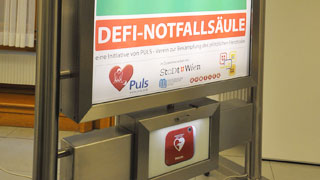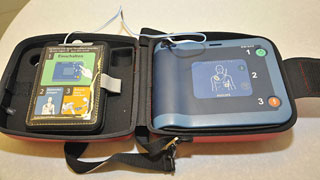More defibrillators for Vienna - every second counts
Sudden cardiac death is still the most frequent cause of death worldwide. The "Electricity For Life" campaign launched by the Puls society sets out to counter this trend in conjunction with the first-aid app of the Workers' Samaritan Federation and 60 defibrillator columns erected in Vienna in cooperation with the City of Vienna and Gewista, Austria's Number 1 in the field of outdoor advertising.
Vienna’s emergency medical service has already been able to carry out 850 reanimations this year. However, life-threatening ventricular fibrillation very quickly results in oxygen deficiency in vital organs, which is why every second counts. Ordinary people can play an important role in the resuscitation of the person before emergency medical services arrive.
Austria guards against cardiac arrest
"Witnesses of cardiac arrest can give effective assistance through the application of strong pressure in the middle of the thorax and the rapid use of a defibrillator. This increases the patient's chances of survival from ten to over 60 per cent," explains Dr. Mario Krammel of the Puls society and the Vienna university clinic. First aid will be even easier to administer in the future, on the one hand thanks to the Workers' Samaritan Federation app, and on the other to even more defibrillator facilities.
250 Defibrillators in Vienna
"The City of Vienna has 190 freely accessible defibrillators for lay responders in municipal departments, swimming baths and sports complexes. With an additional 60 freely accessible defibrillator columns, Vienna’s life-saving network will become even more effective," says Harry Kopietz, president of Vienna’s provincial parliament and Puls ambassador. In collaboration with the City of Vienna and Gewista, over the course of the next six months the Puls society will install 60 City Lights converted into defibrillator columns accessible around the clock. The principle is quite simple: when the defibrillator is removed, this immediately makes a call to the emergency call centre of Vienna’s emergency medical services. Using GPS, they can then see where the helper goes with the appliance. Staff from the emergency call centre give the caller step-by-step instructions on how to give first aid, and at the same time despatch an ambulance to the site. What is more, the defibrillator also features electronically generated instructions. "It is virtually impossible to do anything wrong in administering first aid – apart from doing nothing," explained Sonja Wehsely, Executive City Councillor for Public Health, at the campaign presentation, who herself demonstrated how easy it is to handle the defibrillator.
The project has the scientific backing of the Medical University of Vienna, which evaluates each deployment of the defibrillator columns. The data collected is used to optimize the operation and deployment of the appliances as well as determining where additional defibrillators might be required.
Free app for lifesavers
"Samaritan" - the first-aid app of the Workers' Samaritan Federation (ASBÖ) - can be downloaded free of charge using Apple's iTunes program. The application uses GPS to establish the helper’s current position and shows the location of the nearest defibrillators. It also gives the user assistance in administering life-saving first-aid measures. However, the app is in no way designed to replace a first-aid-course, but rather to provide easy access to first aid. ASBÖ director Reinhard Hundsmüller reassures that the app is updated regularly, so that it is also possible to call up new defibrillator locations throughout Austria.
Source: wieninternational.at
Further information
wien.gv.at-English Edition
Contact form


